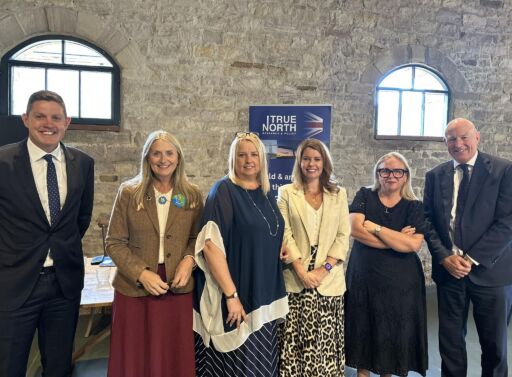By Daniel Harrison MBE, Harrison Foundation
When the latest GCSE results were released, I felt a deep sense of disappointment. Here in the North East, the proportion of top grades has fallen more sharply than almost anywhere else in the country. While England as a whole saw 26.9% of grades awarded at 7/A or above, the North East recorded just 22.4%, which is the lowest of any region. What is even more worrying is the pace of decline: top grades in our region fell by 0.9 percentage points this year, compared with a 0.4 point fall nationally.
On almost every measure, we are moving backwards. According to the same data, the gap between our region and London in terms of top grades has widened to more than seven percentage points. That gap is not just academic – it represents real opportunities lost for our young people. It also represents fewer doors opening to university places, apprenticeships and employment in the industries of the future. Unless urgent action is taken, this educational divide will harden into an economic one, further entrenching disadvantage in the North East.
Organisations such as the Harrison Foundation are doing their best. We’re investing millions of pounds in the futures of our young people alongside some very well established local partners. But we cannot do it all alone. A much bigger, far more ambitious and integrated plan from the region’s leaders is needed for long term success.
This matters because education is the single greatest driver of social mobility. A child who leaves school with strong qualifications stands a far greater chance of securing meaningful employment, moving into independence and breaking the cycle of poverty. Yet too often in policy debates, poverty is addressed almost exclusively through the welfare system.
The Harrison Foundation was built on the principle of a hand up not a hand out. And while benefits can and do provide a necessary safety net, they are not a long-term solution. If the North East’s Combined Authority is serious about eradicating child poverty, then it must redirect far more energy and resources into education as well as what comes later. Education leads to employment and employment leads to independence and dignity. Yet employers can often feel taken for granted when the reality is they provide the long-lasting, generational route out of poverty.
Without that progression, we will continue to treat the symptoms of poverty rather than its root cause.
In 2019, before the pandemic, 24.5% of North East GCSEs were graded 7/A or above. This year, that figure has slipped to 22.4%. That may sound like a small percentage change, but it represents thousands of students each year who are leaving school without the qualifications they need to succeed. Nationally, the rate of decline has been far slower. The evidence is clear – other parts of the country are finding ways to support their pupils more effectively, while our region is being left behind.
Unless this trajectory is sharply reversed, the North East will struggle to attract investment, retain talent and grow its economy. Businesses in technology, advanced manufacturing and professional services may choose to go elsewhere if they cannot recruit the skilled workers they need locally. Those that remain, will quietly get on with their job instead of being recruited and backed by the region’s leaders to become champions of what this area can offer.
At the Harrison Foundation, we have always believed that philanthropy has a role to play in addressing this challenge. We have put our money where our mouth is, investing heavily in education and employability programmes in Newcastle and Sunderland. The results demonstrate what is possible when resources are directed effectively.
In Newcastle, our £200,000 sponsorship of the Harrison Centre at the Newcastle United Foundation has supported dozens of students through BTECs in digital skills in the past year alone. An additional 4,027 young people engaged with the Centre’s programmes, from after-school clubs to employability workshops. The outcomes speak volumes: 90% of Level 3 students completed and passed their qualifications, while others progressed directly into jobs, including apprenticeships with employers such as SAGE and Ernst & Young.
Beyond the Harrison Centre itself, we launched a £360,000 partnership with the Newcastle United Foundation and six secondary schools across the city. Since September 2024, 945 young people have been supported through our classrooms. More than 380 pupils with special educational needs or disabilities have taken part, double the original target. The impact has been measurable: 163 qualifications were awarded, 93% of students reported feeling inspired and engaged, and attendance and behaviour improved significantly in case study schools.
In Sunderland, our partnership with the Foundation of Light, now in its eighth year with over £600,000 invested so far from the Harrison Foundation, supported 367 learners across two cohorts this past year. Among adults, 316 participated in training programmes, with 201 progressing into further education or employment. Crucially, 94% of those who entered work remained in sustained employment six months later, a figure far above national benchmarks. For young people aged 16–18, progression into further education has also been strong, providing a stepping-stone toward long-term independence.
These are not abstract numbers. They represent private investment in hundreds of young people gaining skills, qualifications and opportunities they might otherwise have missed. They demonstrate that with the right support, outcomes can improve dramatically.
Yet as proud as I am of what the Harrison Foundation has achieved, I must also acknowledge that philanthropy alone is not enough. Our investments – while significant – touch only a fraction of the pupils in need across the North East. The scale of the problem demands a far broader, systemic response.
We need local government, central government, businesses and charities to work together to make education the central pillar of regional renewal. And not just for the current or next election cycle, but the full life cycle of our young people and families that aspire to much more.
That means more funding for targeted support, more collaboration with employers, and more recognition that education is not an optional extra but the foundation of long-term prosperity.
The GCSE results published this summer should serve as a wake-up call for all of us. They tell a story of a region falling further behind its peers. But they also present an opportunity. If we act decisively now and invest in education with the same urgency with which we discuss infrastructure or economic development, I believe we can close the gap.
The North East has enormous potential. Our young people are just as capable as those in London, the South East, or anywhere else in the country. What they lack is not ability but opportunity. We must ensure they have the tools to succeed, because if they do, our region will succeed with them.

















